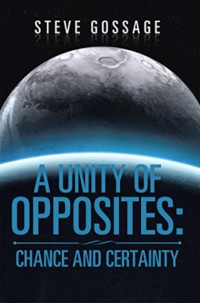Title: A Unity of Opposites: Chance and Certainty
Author: Steve Gossage
Publisher: XlibrisUS
ISBN: 978-1-54341-087-7
Pages: 202
Genre: Science Fiction
Reviewed by: Thomas Macolino
Pacific Book Review
All genres have their own core questions. For mystery, the question is, “who did it and how?” For literary fiction, the question is “have you thought about this particular aspect of human existence?” For science fiction, the question is, “what if?” What if our planet was about to be destroyed to make way for a space highway? What if robots were real, with real human emotions? Etc. For Steve Gossage’s A Unity of Opposites: Chance and Certainty, the question is, “what if humans were growing more rational?”
In the 22nd Century, an asteroid threatens to collide with Earth. In an irrational move influenced by lobbyists, world leaders decide to test out new weapons on the asteroid instead of simply using rockets to shove it off course. The resulting debris from the explosion result in the death of millions and the beginning of a new ice age. In the years following, the communities of Earth come together to form a new international utopia. The only exception is a minority coalition of Aryans and neofacists, who wish to overthrow the United Democratic Nations (UDN) in order to maintain their perceived superior place in society.
Gossage’s 22nd Century Earth is a difficult place for the reader to identify with. The novel’s protagonist, Johnathan Cole, isn’t introduced until the second chapter, by which point I’d already imprinted the protagonist of the first chapter, Doug Parker (who is referenced after chapter 1, but never appears again in person). The characters are likewise confusing; their conversations are primarily comprised of direct statements or pure exposition, creating seemingly inhuman dialogue. However, this appears to be a product of the world Gossage has created. In Gossage’s world, irrationality is a dying concept. Racism is treated like a disease. White terrorists are captured and rehabilitated instead of being punished. Countries welcome refugees during times of crisis without hesitation. Vegetarianism is widespread, (primarily for its functionality, as meat is an inefficient food source). Even rebellious neofacists surrender peacefully when the conditions are suboptimal instead of fighting to the last man. The list of examples could run for the length of the entire novel.
In terms of concept, A Unity of Opposites: Chance and Certainty provides its audience with an interesting read. True to sci-fi tradition, Gossage provides elaborate explanations for every aspect of his world, crafting an expansive universe for his reader to explore. However, I personally found that the novel’s optimistic nature ultimately detracted from its tension. The great majority of the issues found in the book become non-issues as the rational humans cooperate without hesitation. The novel’s villains are too rational, too kind, to be truly fearsome. But for readers who need a break from the recent surge in gritty (often graphic) darkness of books like Game of Thrones, this is certainly a novel to take a look at.


